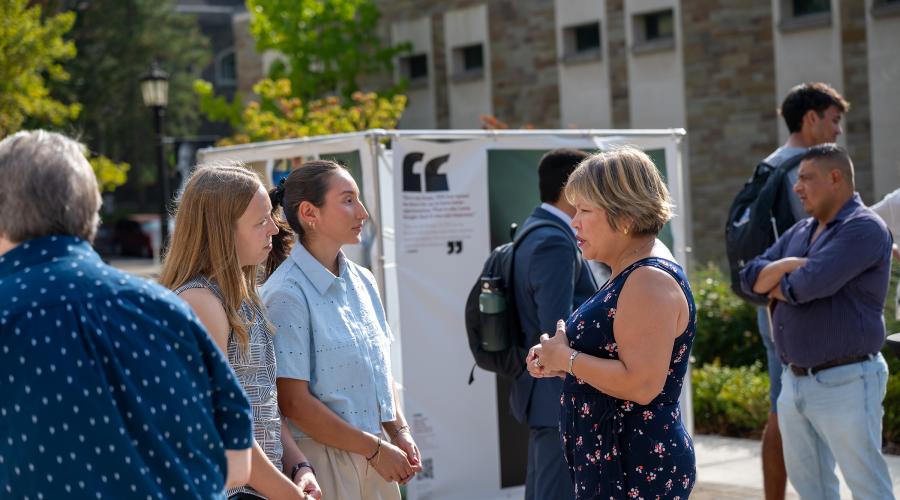
ILR School Hosts “Stories of Belonging” Immigration Project Exhibit
by Macey Bone and Leah Cruz (Worker Institute Undergraduate Research Fellows)
How does it feel when the place you’ve called home for decades is suddenly no longer yours? During the week of September 16th through September 20th, the ILR Worker Institute hosted an outdoor exhibit highlighting stories like these entitled “Stories of Belonging: Central American TPS Workers and the Defiant Struggle to Stay Home in the U.S.”
TPS, or Temporary Protected Status, is an immigration status granted to individuals from specific countries facing conditions that make it unsafe for them to return. Established by the Immigration Act of 1990, this federal program was intended as a temporary solution. However, 34 years later, it remains just that—temporary. TPS provides no pathway to permanent residency or citizenship in the U.S., leaving individuals who have lived here for over three decades without a clear route to permanency. The ongoing status of the program is reviewed every 6 to 18 months, depending on the decision of the sitting president. As a result, those under TPS must closely monitor leadership changes to determine whether the program and their TPS status will be continued.
Throughout the week in mid-September, students, faculty, and community members were encouraged to walk along the pathways of the ILR School’s Thomas P. Golden Courtyard, observing the 18 interactive, 6-foot-high portraits that highlighted the experiences of people with TPS. Visitors were encouraged to scan QR codes that made the stories come to life and showcased videos of participants. This project was created and led by ILR Worker Institute Executive Director Dr. Patricia Campos-Medina and also highlighted the work of former Worker Institute Research Fellows, including Elle Michel.
Elle, who began researching with Dr. Campos-Medina in the fall of 2022, discussed the importance and challenges of this project. “The hardest part was definitely doing the research. We had to search through the archives of Catherwood looking for anything relating to the TPS movement,” said Elle. She continued, “It took a lot of meticulous work… There were days when we didn’t find anything, and we really didn’t want to let Dr. Campos-Medina or the workers whose stories she was telling down.” When asked what she wanted people to take away from this project, she said, “I hope people come to understand how unfair the system is. These individuals are rebuilding their lives and making significant contributions to American society. Yet, they aren’t given the same rights or opportunities for citizenship. Their contributions go beyond just labor, and I hope people realize that we all need to stand together with them in their fight for the right to stay.”
Dr. Campos-Medina supplemented the week’s events by giving short lectures in various classes around ILR. These lectures gave an overview of TPS and an introduction to the project, and students were shown videos of the workers' stories. When asked what she learned, ILR senior Rafhilene Frias-Sanchez said, “I was unaware of this program [TPS]. This lecture opened my eyes to how much presidential election results can interfere with someone's entire livelihood.” She continued by highlighting how this project impacted her future civic engagement. “I am going to encourage people to vote, and I am going to do more research about candidates and where they stand on TPS.”
The highlight of this week’s events was the guided tour of the project and the reception that followed. Guests had the opportunity to walk around the exhibit, mingle, and take in the powerful display. Community members could view the photos and read the testimonies of the spotlighted TPS workers, gaining a deeper understanding of their experiences. After guests had time to explore, Professor Ileen Devault delivered a brief introduction, offering background on the Worker Institute and its mission. She then introduced Dr. Patricia Campos-Medina and acknowledged the contributions of the Worker Institute Research Fellows. Dr. Campos-Medina shared insights about the project, emphasizing the true meaning of being an American – as an identity that is not defined by residency status, but by ideals of freedom, opportunity, and equality. In discussing her research, she highlighted the importance of conducting interviews in participants' native languages, which enables them to reveal deeper, more authentic insights. Since language is often intertwined with culture and identity, it can uncover layers of meaning that might be lost in translation. Dr. Campos-Medina reaffirmed her commitment to capturing and sharing the genuine lived experiences of her participants.
Students were able to gain more than just a greater understanding of TPS from the guided tour. Rene Cabrera, a sophomore in the ILR School, shared that the event broadened his interest in immigration policy and deepened his understanding of the communities he grew up in. “It was great to see research that was related to my ambitions at ILR. The event connected with my educational goals and taught me a lot,” said Rene. When asked if any stories stood out in particular, Rene responded by saying, “A lot of the workers came from the same fields and occupations that I grew up knowing. Specifically, the workers in housekeeping and domestic work, those stories and experiences were very similar to my family back in Kansas.”
The significance of this project resonates even more deeply now, especially at a time of change with the recent U.S. elections. TPS represents a broader conversation about the impact of U.S. immigration policy, particularly for individuals from countries facing social, political, and economic crises. Spotlighting the voices and experiences of TPS workers, the "Stories of Belonging" project emphasizes the need for an equitable approach to immigration reform—one that acknowledges the contributions of these individuals and addresses the systemic challenges they face. The exhibit serves as a timely reminder of the power of storytelling in shaping public discourse and influencing policy, encouraging all of us to stay informed and engaged in the democratic process.
